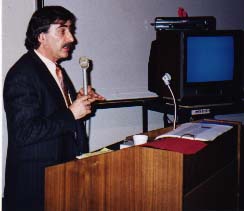On April 17, 1998, Dr. Levon Marashlian intrigued the audience during his lecture and film presentation on the Armenian genocide. This was just one highlight of the many April 24th commemoration activities.
Marashlian, currently a professor of history at Glendale Community College, is a graduate of the University of California, Los Angeles and has conducted extensive research regarding the Armenian genocide. He has also studied the Turkish government’s attempt to distort Armenian history. He was present at the dicussions in the Congressional committee on the Armenian question.
The main premise of Marashlian’s presentation was examining Turkey’s denial of the genocide and the Armenian response in the 1990’s. According to him, we as Armenians need to forcefully pursue the recognition of the genocide. As noted by Marashlian as an example of the denial, Mark Lambert Bristol was the first to deny the Armenian genocide’s existence, which occurred in 1915. An opinion by Marashlian stating why Bristol was in adamant denial was that this behavior would be beneficial in promoting business for American interests. He also noted that Bristol later changed his position and now is a very important source for the Armenians.
According to Marashlian, Bernard Lewis is another individual who actively denies the genocide. Lewis believes that the cause of the Armenian massacres was Turkish despotism, which is having a single, absolute leader or tyrant, and notes that despotism cause rebellion and destruction by the both sides. Besides Bristol and Lewis, Marashlian cited Justin McCarthy as the most promient and important figure for the Turkish denial of he genocide. He is a graduate of UCLA and has been extremely instrumental in the Turkish cover up. But Dr. Marashlian also showed the audience how someone such as McCarthy can be dealt with and that is by knowing the facts and asking the right questions.
Between the period of 1975 to the present, many resolutions in favor of the Armenian genocide were introduced in Congress, and all were denied. Turkish pressure and denial remained consistent responses to Armenians demands for recognition. In 1990, a resolution SJR 212 was introduced by Senator Dole, yet failed by a close vote. Marashlian stated that although the resolution for recognition from Turkey failed, a somewhat positive note was that Turkey recieved a lot of negative PR and that this was just a beginning for an increase in interest and awareness for the public.
There was another attempt to pass a resolution in Congress in 1996. Some opponents of the resolutions noted the genocide as “intercommunial warfare” and “ethnic disputes”. This criticism may have been a large part of the rejection by Congress. The bottom line is that Turkey is an important ally to the US, and thus pressure from the Turkish government works. That is why it is so difficult to pass any resolution in Congress.
Marashlian believes that our continued fight for this battle is not over and will not go unheard. Although many textbooks and history classes decline to include recognition of the Armenian genocide within the curriculum, it now can be taught in thr public education system. More and more scholars and historians are confirming the Armenian Genocide as fact. A recently aired film, The Great War, states in regards to the Armenian genocide, “War is hatred and hatred is extermination.” Dr. Marashlians lecture was clear in proving that the focus must be education and publicity in order to stop and end the Turkish Governments attempt to distort history.
 Hye Sharzhoom Armenian Action
Hye Sharzhoom Armenian Action
